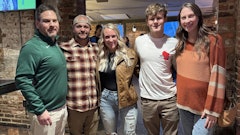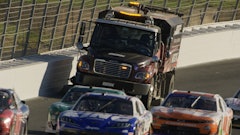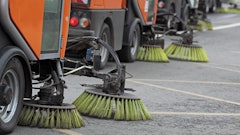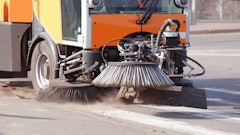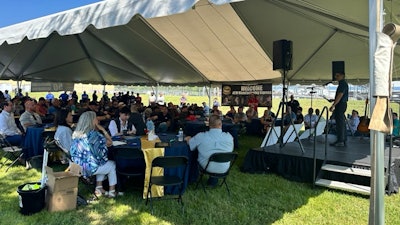
The Association of Equipment Manufacturers (AEM) made its most recent stop on it's eponymous AEM Manufacturing Express summer tour, highlighting the strength of America's manufacturing all across the country. AEM is a nonprofit organization that focuses on connecting communities with the workers that build the equipment that makes infrastructure across the United States possible.
That celebration coincided this week with the 50th Anniversary of Schwarze Industries LLC. In addition to a beautiful day outside on the grounds with food and fun, it also featured a performance by Brandon Elder from American Idol.
Where The Magic Happens
The day included a tour of the factory where the A, S, and M sweeper lines are all produced. Nick Bruhn, Schwarze product manager, explained that every morning begins with an all team management meeting, addressing needs, issues, and any heads-up changes that particular day might have.
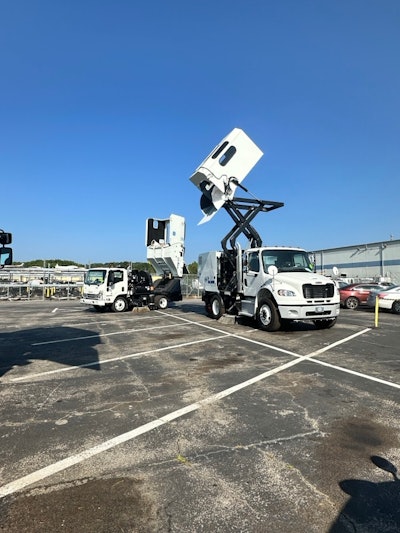 Megan Perleberg
Megan Perleberg
"We go over everything from current issues to what's coming up next," said Bruhn. "Everything is broken down by the different lines and by the different chassis and model types, so that we can see exactly where we are, and nothing gets lost that way. Our goal is to provide the best level of service to the customer. All of us are problem solving. Is something not working? Who needs to get involved? Let's have an action plan."
Reflecting back on its storied fifty years, Bruhn told those on the tour how Bob Schwarze, a former NASA engineer, started from literally the ground up. As the story goes, he saw people manually picking trash and other waste in a parking lot and figured there had to be a better way to get the job done.
"He bought a couple sweepers, but he didn't find they fit the bill [for him]," Bruhn said. "He started building his own trucks for himself, and then other people saw and wanted them."
In those early days the focus was really on the parking lot sweeper market (today the S line of sweepers), but in the 1980s the company acquired what are the A and M lines (regenerative air and mechanical, respectively).
"We have the best people standing behind [our] product. That's why we've grown over the time," said Joe Hendrickson, Vice President of Sales and Marketing at Schwarze. "Part of what we wanted to feature today is our investment in innovation for the future." This was in reference to the company's M6 Avalanche EV, and to other future sustainable-focused products the company has in the pipeline.
"You all make a difference, whether you don't even realize it [or not], you have a connection with it. The people you know, the products you trust for a better planet," Hendrickson said, extending the company's traditional slogan, speaking to the group of gathered employees and visitors.
Keeping the Community Beautiful and Safe
The primary role of sweepers is keeping pavements clean, whether in parking lots, airports, or city streets, but the impact isn't just about esthetics and appearances. As is the case in many states, littering is a big problem in Alabama, so Keep Alabama Beautiful was present at the event promoting a spirit of cooperation.
The group is non-profit who's mission, according to their website, "Is to enable volunteers throughout Alabama to improve litter prevention practices, recycling, beautification and community greening efforts."
"Litter is dirty, dangerous and illegal," said Denise Taylor, who serves as executive director. "It's very, very important to be able to sweep in the communities, to keep that from going into the storm water system and then out to the waterways that Alabama is blessed to have. It's really hard to clean up once it gets in the waterways. This is our shared mission with Schwarze, to keep our cities clean, and I appreciate all that they do across the nation. Where volunteers can't go, we know that sweepers can go."
However, the importance of consistent sweeping goes beyond just litter, there's also direct and indirect safety impacts, as well as, the long term preservation of pavements.
"Airport runways are cleaned [with sweepers] for safety," said David Heigl, president of Schwarze. "And they follow milling machines so that you can [better place] tack and put down asphalt that'll last longer."
Heigl also reinforced the company's commitment to the next generation of technology through research and development, increasing efficiency and environmental sustainability.
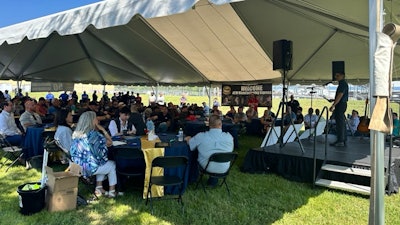 Megan Perleberg
Megan Perleberg
"We're pragmatic here. This electric stuff can make sense." said Heigl. "If we remove the hydraulics and put in electric motors, they're more efficient. All of a sudden, you got a more efficient machine. We can put this on a diesel chassis and save fuel and make it pragmatic.
We can save a lot of fuel, cut down on the noise, make it more efficient, increase the torque and make a better machine."
Schwarze has also invested in the community in other ways, by supporting the Free 2 Teach initiative. Alison Kling, executive director, spoke briefly about their efforts
"My very first meeting was with Schwarze, and we sat down to lunch, and right away their first question was, 'How can we support you? How can we get supplies to kids who need them?'," Kling recalled. "What we do is invest in teachers directly so that our classrooms and our communities are awesome and full of our future."
Schwarze presented Kling and Free 2 Teach with a donation of $5,000 at the conclusion of her speech.
The People Behind It All
There are two hundred employees that make the Huntsville Schwarze location work on a daily basis, and another three hundred in Selma. These are the real backbone of the company, and were a large focus of the event overall. Costas Cordonis spoke about his journey from an eighteen-year-old immigrant student from Greece to becoming warranty and training administrator.
"I wasn't able to speak a word of English," said Cordonis. "Adapting to this new world for me was not easy. There were moments to where I felt like I wanted to jump on the plane and just to return back to Greece. But in 1987, a small company named Schwarze offered me a job as well as control manager and I haven't looked back since."
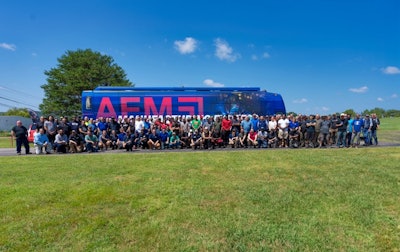 Megan Perleberg
Megan Perleberg
Stories like this are exactly the purpose of the AEM Manufacturing Express tour, as was pointed out by Senior Vice President, Government & Industry Relations at AEM, Kip Eideberg, during his time at the podium.
"This is more than just a bus tour," said Eideberg. "The Manufacturing Express is our opportunity to tell your [workers] stories, because behind every piece of equipment, whether it's a beautiful sweeper, like the ones here, an excavator, a combine harvester. There's a story, and it is our job to tell the stories of the 2.3 million men and women of the equipment manufacturing industry. Those stories are critical. That's what this initiative is all about, to tell your stories, to celebrate your work, your determination, your can-do spirit, and to highlight the amazing products that you build all across this country."
Reese Phillips, an electrical design engineer, who recently joined Schwarze just three months prior said, "The biggest thing for me has been how relaxed it is, and we're given a lot of freedom. They let you self direct, and I appreciate that. Also, it means a lot more when you feel like you're more involved in the actual engineering process, and not just purchasing something and plugging it in."
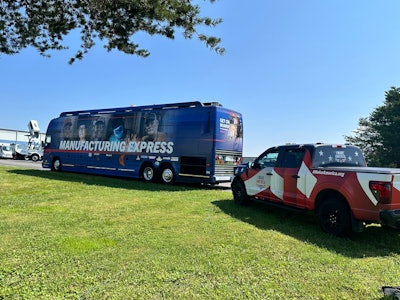 Megan Perleberg
Megan Perleberg
David Jones started with the company 30 years ago, in 1994, and has stuck with it for the long-haul. "One of the things that really I love about Schwartz is the people I work with," Jones said.
AEM still has 50 more stops on its tour, and in a separate interview with Kip Eideberg, he gushed about how successful the experience has already been.
"This is primarily about storytelling, right," Eideberg said. "Telling the stories of the people that work in the industry. They get overlooked often. You know, the focus tends to be on the company, yes, but not the people. We don't meet the people that are working in the factory and actually building the equipment. So, I think it's really powerful to see that they're so invested in this, too.”


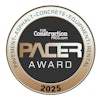
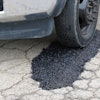
![Pavement Awards 2025[main]](https://img.forconstructionpros.com/files/base/acbm/fcp/image/2024/05/PavementAwards_2025_main_.665883e4276e8.png?auto=format%2Ccompress&bg=fff&fill-color=fff&fit=fill&h=100&q=70&w=100)
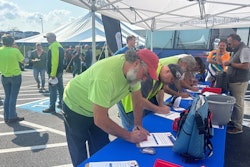
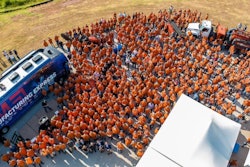
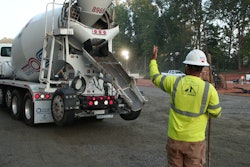




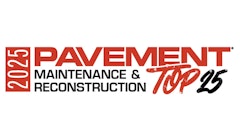
![Pavement Awards 2025[main]](https://img.forconstructionpros.com/files/base/acbm/fcp/image/2024/05/PavementAwards_2025_main_.665883e4276e8.png?ar=16%3A9&auto=format%2Ccompress&bg=fff&fill-color=fff&fit=fill&h=135&q=70&w=240)

